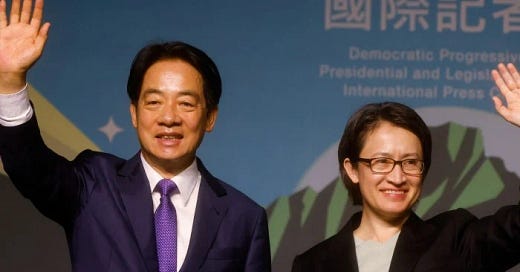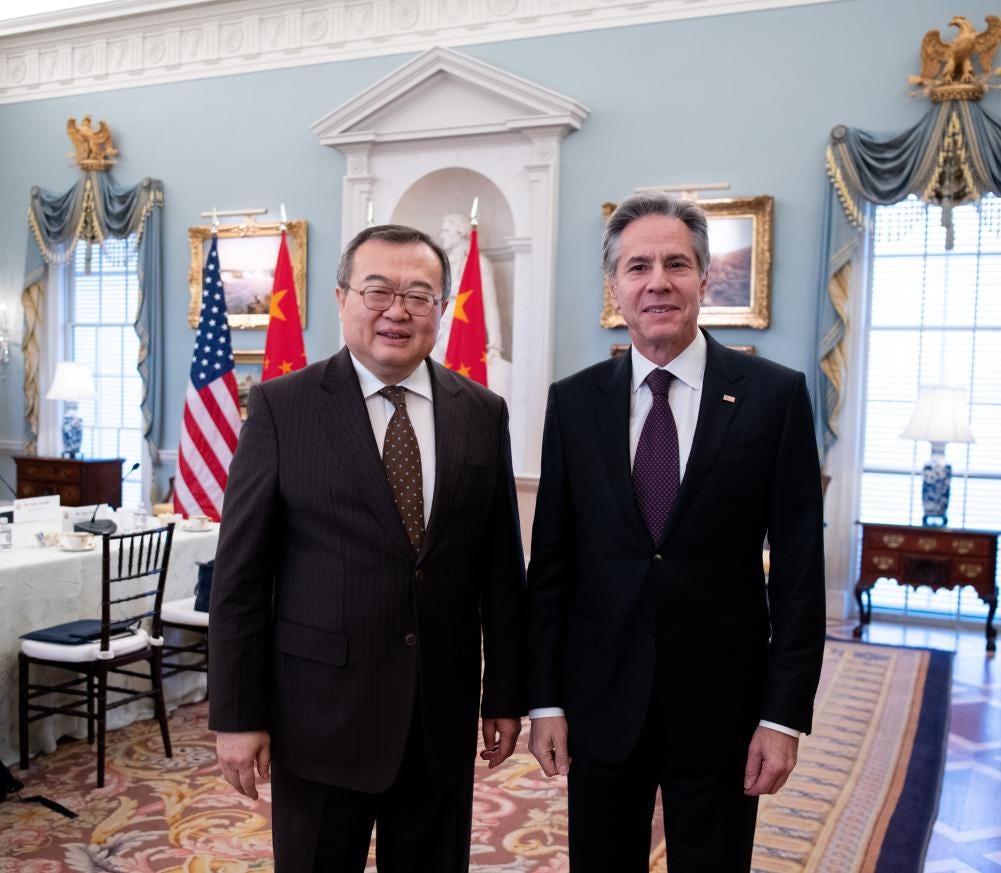My latest #ThoughtoftheDayonChina: Taiwan's election matters but not in the way the global media has written; Sadly, Taiwan’s future is not decided by people in Taiwan, but by China and US.
Updated with the significance of Liu Jianchao's visit to the US. My contrarian take on Taiwanese Presidential Election 2024 and its ramifications for the island, China, and the United States.
On Saturday, January 13, 2024, Taiwan’s pro-sovereignty ruling Democratic Progressive Party pulled off a “historic” third presidential victory, which has already triggered an intense discussion on the international media about the ramifications for the trilateral relationship among the island, China, and the United States.
As William Lai Ching-te, Taiwan’s current vice president, declared victory, the global media have understandably focused on the fact that the accession of Lai whom the Chinese mainland has repeatedly branded a “troublemaker” over his stance on independence is expected to heighten cross-strait tensions and the geopolitical jostling between Beijing and Washington.
The global consensus is that Taiwan has become one of the world’s flash points, particularly after Russia’s invasion of Ukraine.
With Lai’s decisive win, some journalists and commentators would most likely play up the various scenarios of gloom and doom in the weeks and months ahead in which Beijing will be described as taking more aggressive steps in pressing its reunification claims, and Taiwan under Lai’s leadership is expected to diverge further from the Chinese mainland with Washington’s support.
My view is contrarian. I believe that Taiwan’s latest presidential election results matter a great deal but not in the way in which the international media have written.
DPP may have made history as the first party to win the presidency three times in a row since direct presidential elections were introduced in 1996 but its so-called “historic” win is tempered by the fact that it lost control of its legislative majority, which could serve as a major challenge to Lai’s presidency in the next four years.
In many ways, democracy is a bigger winner. Taiwanese voters are united in support of democracy and they have become more politically matured. They may have snubbed Beijing by electing the pro-sovereignty Lai as the president but returned a new parliament controlled by the opposition to serve as checks and balances to his presidency.
Ko Wen-je, the former Taipei mayor who ran under the banner of the Taiwan People’s Party which was formed only in 2019, secured more than 26 per cent of the vote, which would make him and his party the third major political forces to reckon with in a revamped political spectrum.
All this help explain why on the night of his victory, Lai said he favored more exchange and dialogue with Beijing and he vowed to “maintain the cross-strait status quo”, which is widely interpreted as neither seeking independence from nor reunification with China.
It is not so far off the mark to assume that Lai, self-claimed “a pragmatic worker for
Taiwan’s independence”, is most likely to continue Tsai’s policy of being assertive in defense of the island’s democracy and raising its international profile while trying to adopt non-confrontational stance with Beijing.
In the run-up to the election, Beijing repeatedly warned that by choosing the next president, Taiwan voters would choose between war and peace – a standard statement from its playbook on every presidential election in Taiwan.
Hours after Lai emerged as the winner, a spokesman from the Taiwan Affairs Office, issued a muted statement saying that the election results revealed the DPP “cannot represent the mainstream public opinion on the island.”
“Taiwan is China's Taiwan,” he said. “The elections will not change the basic landscape and development trend of cross-Strait relations, will not alter the shared aspiration of compatriots across the Taiwan Strait to forge closer ties, and will not impede the inevitable trend of China's reunification.”
Beijing has braced itself for Lai’s win and the fact that Lai would have to work with a legislature controlled by the opposition was probably best outcome it could hope for. After all, Lai secured only about 40 per cent of the popular vote.
Looking ahead, is Beijing most likely to go into overdrive by stepping up military actions and sharp rhetoric?
For the short-term, Beijing is very likely to increase pressure on Taiwan in the run-up to Lai’s inauguration in May.
But in the longer-term, that really depends upon Lai’s policy direction towards the cross-strait relations but more importantly on the US, the biggest backer of Taiwan.
From Washington’s point of view, it should welcome whoever as Taiwan’s new president because following the long-standing tradition, all three candidates went to visit Washington and received blessings from the US officials in the run up to the presidential election.
U.S. Secretary of State Antony Blinken congratulated Lai on his victory and said the United States "is committed to maintaining cross-strait peace and stability, and the peaceful resolution of differences, free from coercion and pressure."
He said the U.S. looks forward to working with Lai and leaders of all parties in Taiwan to “advance our shared interests and values, and to further our longstanding unofficial relationship, consistent with the U.S. one China policy as guided by the Taiwan Relations Act, the three Joint Communiques, and the Six Assurances.”
Perhaps more reassuring to the ears of the Chinese officials was the comment made by the US President Joe Biden who said the US does not support the independence of Taiwan, when asked for reaction to Saturday’s elections.
Moreover, Liu Jianchao, Minister of the Chinese Communist Party’s (CCP) International Liaison Department, made a rare visit to the United States and met with business and policy makers ahead of elections in Taiwan.
The fact that Liu, who is now rumored to become China’s Foreign Minister, met with Blinken to discuss the cross-strait relations on Friday, just one day ahead of Saturday’s elections, is very significant in timing, aimed at sending a very subtle message.
I am not being cynical here but unfortunately Taiwan’s future is not really decided by people in Taiwan. It was, is and will be decided by Washington and Beijing.
Since 1979 when Beijing and Washington resumed diplomatic relations until 2018 in the middle of the Trump administration, the Taiwan issue was highlighted in every meeting between both sides but in fact it was never an issue. Both sides had a tacit understanding to maintain peace over the Taiwan Strait.
The China hawks in the Trump administration started to play the Taiwan card – a move which the Biden administration continued until the China-US summit in San Francisco last year. After five years of testing each other’s lines on Taiwan, I think Beijing and Washington reached another tacit understanding over the island as both sides clearly know what is at stake.
Biden reportedly planned to dispatch an unofficial delegation to take part in Lai’s inauguration ceremony, including some former high-ranking American officials – a standard practice which occurred in the past. Beijing will most likely raise objections but the fiery rhetoric will pass very soon, if the past experience could be any guide.
People may be worried that Lai’s win could galvanize the China hawks in Washington but Taiwan and the US should have good reasons to prevent the repeat of the high-level visit by then-House Speaker Nancy Pelosi who visited Taiwan in 2022, the highest-ranking U.S. official to visit the island in 15 years. Then Beijing sharply increased military exercises over the Taiwan Strait in response and greatly heightened the cross-strait tensions.
It is really up to Washington and Taipei to prevent this kind of visit from happening again. In April 2023, Taiwanese President Tsai met with Pelosi’s successor Kevin McCarthy in California instead of having him visit the island, which would have been seen by Beijing as a much more incendiary move.
In summary, expect to read lots of rhetorical fireworks over the Taiwan issue in the international media in the coming months but in reality, Beijing and Washington are expected to keep their cool, by and large.
End.






I’m not from Taiwan or the mainland, but I think people of Taiwan need to think about whether an “independent Taiwan” can ever be truly independent or forever remain a tool of the US to put down China. Like Japan and S Korea, it would be forced to host the US military.
In fact, I think a Taiwan that is part of China will have far more independence than an “independent Taiwan”.
As a descendent of Chinese migrants, I am sorry the Taiwanese don’t see that they have a genuine opportunity to help the mainland become more democratic by seeking reunification with the mainland on terms that preserves their system of democracy. Show China by example how democracy works.
Thank you for this piece. I sincerely hope there are many years of peaceful existence between China and the U.S. but this seems to be a minority opinion.